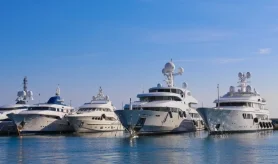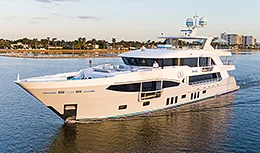- Alaskan Yachts
- Azimut Yachts
- Back Cove Yachts
- Beneteau Yachts
- Benetti Superyachts
- Bertram Yachts
- Boston Whaler
- Broward Yachts
- Buddy Davis Sportfish
- Burger Yachts
- Cabo Yachts
- Catamarans
- Carver Motoryachts
- Center Console
- Chris-Craft Yachts
- Cruisers Yachts
- DeFever Trawlers
- Dufour Sailboats
- Fairline Yachts
- Feadship Yachts
- Ferretti Yachts
- Formula Yachts
- Fountaine Pajot Cats
- Grady-White
- Grand Banks Trawlers
- Hargrave Yachts
- Hatteras Yachts
- Hinckley Picnic Boats
- Horizon Yachts
- Hydra-Sports
- Intrepid Boats
- Jarrett Bay Sportfish
- Jeanneau Yachts
- Kadey-Krogen Trawlers
- Lazzara Yachts
- Lekker Boats
- Luhrs Sportfish
- Marlow Yachts
- Maritimo Yachts
- Marquis Yachts
- McKinna Motoryachts
- Meridian Yachts
- Midnight Express
- MJM Yachts
- Mochi Craft
- Neptunus Motoryachts
- Nordhavn Trawlers
- Nordic Tugs
- Numarine Yachts
- Ocean Alexander Yachts
- Offshore Yachts
- Outer Reef
- Oyster Sailing Yachts
- Pacific Mariner Yachts
- Palmer Johnson Yachts
Space Tourism: Rocket Man
How space tourism became the next big trend in luxury travel and gave rise to the “billionaire space race”.
This article was written by Rachel Ingram.
As the world becomes increasingly well-traveled, people are looking further and further afield for new experiences. The globe’s most intrepid explorers even have their sights set outside of our atmosphere—to outer space.
In a challenge that’s been dubbed the ‘billionaire space race’, three of the modern world’s most successful entrepreneurs, Jeff Bezos, Richard Branson and Elon Musk, are competing to bring such dreams to life. For several years, the business magnets have been battling to launch ground-breaking commercial space flights each offering a different yet equally enticing proposition to adventurous travelers with deep pockets. And with space tourism travel market projected to reach $12.6 billion by 2031, according to Allied Market Research, the potential of the emerging sector is out of this world.

So, who is currently winning the space race?
The name dominating headlines this year is Virgin Galactic, owned by Richard Branson. The Virgin Group founder created the company in 2004 to give tourists the opportunity to experience space via a suborbital flight of the globe. On 10 August, Virgin Galactic sent its first private customers to space onboard VSS Unity spacecraft Galactic 02 a major step forward for the global space tourism industry, and for Branson.
The commercial flight took off from Spaceport America in New Mexico carrying two pilots, a trainer and three passengers, who were transported to an altitude of almost 50,000 feet, where they could observe the planet and experience weightlessness. The experience was filmed for the world to enjoy.

Virgin’s journey to lift-off was not plain sailing, however. During testing in 2014, the company experienced the in-flight loss of its VSS Enterprise vessel one pilot was killed and a second injured. But they soldiered on, created a new craft and now claims to have a backlog of about 800 passengers willing to pay the fee of around $450,000 per seat.
The company hopes to expand its fleet and eventually host around 400 annual flights. It also recently announced plans to build an astronaut camp in New Mexico where customers will spend five days training before their flight.

Elon Musk, founder of Tesla and owner of Twitter, started his space journey slightly earlier than Branson, in 2002, with the formation of SpaceX (The Space Exploration Technologies Corporation).
It offers a different proposition from Virgin, specializing in lunar tourism and trips beyond Earth’s orbit.
For the last few years, the company has been quietly developing its Starship spacecraft, and last year it announced its first space tourist, Dennis Tito, has signed up for a flight to the moon. Tito is no stranger to space travel in 2001, he paid around $20 million for a private trip to the International Space Station, where he spent a week. His mission with SpaceX will see him journey to, and around, the moon onboard Starship.

In 2025, SpaceX plans to launch human spaceflight missions to Haven-1, a space station currently being developed by American aerospace company Vast, onboard its Falcon 9 rocket. There are also plans to allow four astronauts to spend up to 30 days at the station. Looking further forward, Musk has said he hopes to build spaceships capable of transporting humans to Mars to cultivate a new settlement on the Red Planet.
Of the three entrepreneurs, Amazon founder Jeff Bezos was actually the first to enter the space race in 2000.
Like Virgin Galactic, his company Blue Origin offers suborbital travel experiences, set at a lower price point of about $200,000 per seat. The experience onboard the New Shepard rocker transports six passengers to the edge of space and back in about 10 minutes. For an extra $50,000, customers can venture outside of the Earth’s atmosphere to experience weightlessness and view the planet from just outside of its orbit.

The maiden flight, whose passengers included Bezos, took place successfully in July 2021, but flights were halted in September 2022 when an uncrewed mission was forced to abort mid-flight. Tourist trips are due to begin again in 2024.
The sky is no longer the limit for those seeking unique and unforgettable excursions.
To date, commercial space travel has been a rich man’s game, but there are alternative experiences in development for budding astronauts with less grandiose budgets.

Florida-based Space Perspective a partner of Denison Yachting plans to use ‘space balloons’ instead of rockets to transport explorers to the edge of outer space for an otherworldly six-hour experience. Eight passengers and a captain will enter a pressurized capsule that’s lifted by a giant hydrogen balloon to a height of 100,000 feet. The pod offers 360-degree views of the planet and has a ‘Space Lounge’ where guests can enjoy cocktails there’s even WiFi so ‘astronauts’ can stream their experience back down to Earth. On the homebound journey, the balloon will detach, and the capsule will slowly descend for collection.
Flights are scheduled to launch in 2024 and Denison has already reserved a capsule intrepid travelers are invited to enquire about joining us for the adventure or booking their own. “We are thrilled to be partnering with Space Perspective to bring the leader in luxury spaceflight experiences to our clientele,” says Jennifer Welker Peacock, Denison’s Manager of Brand Partnerships. “The sky is no longer the limit for those seeking unique and unforgettable excursions.”

Of course, space travel isn’t without its risks, but for those brave and wealthy enough, a flight on a spaceship could one day become as common practice as a superyacht charter.

Request a Copy






